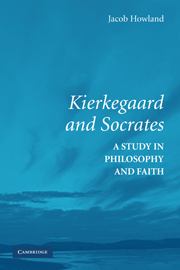Book contents
- Frontmatter
- Contents
- Note on Texts and Translations
- Acknowledgments
- Kierkegaard and Socrates
- Introduction
- 1 Johannes Climacus, Socratic Philosopher
- 2 Climacus's Thought-Project
- 3 Platonic Interlude: Eros and the God
- 4 Climacus's Poetical Venture
- 5 The Paradox and the Passion of Thought
- 6 Self-Love and Offense
- 7 Faith and the Contemporary Follower
- 8 Climacan Interlude: On Historical Necessity
- 9 The Follower at Second Hand and The Moral
- 10 Socrates in Postscript
- Epilogue: Kierkegaard on Christ and Socrates
- Works Cited
- Index
5 - The Paradox and the Passion of Thought
Published online by Cambridge University Press: 01 December 2009
- Frontmatter
- Contents
- Note on Texts and Translations
- Acknowledgments
- Kierkegaard and Socrates
- Introduction
- 1 Johannes Climacus, Socratic Philosopher
- 2 Climacus's Thought-Project
- 3 Platonic Interlude: Eros and the God
- 4 Climacus's Poetical Venture
- 5 The Paradox and the Passion of Thought
- 6 Self-Love and Offense
- 7 Faith and the Contemporary Follower
- 8 Climacan Interlude: On Historical Necessity
- 9 The Follower at Second Hand and The Moral
- 10 Socrates in Postscript
- Epilogue: Kierkegaard on Christ and Socrates
- Works Cited
- Index
Summary
From what we have seen so far, it would be fair to say that Fragments is driven by paradox. It begins with what appears to be a total opposition between the philosophical and religious hypotheses. Climacus paints in black and white with no shades of gray. If the truth can be learned, we can either learn it on our own or we cannot; there is logically no other possibility, nor can both claims be true at the same time. Either the religious hypothesis is true, or it is an illusion; either the philosopher has access to the truth, or he is simply untruth. There seems to be no middle ground, nor any ground outside of philosophy and religion besides the skepticism that insists that the truth cannot be learned at all. To borrow the Hegelian terminology that Climacus draws on in Chapter Three, the difference between philosophy and religion cannot be mediated.
Yet Fragments concludes with the suggestion that the proper judge of Climacus and his thought is Socrates, the philosopher. What is more, Socrates is hard to pin down in Fragments, just as he is in the pages of Plato. Socrates' relationship with “the god” fits neither of the two hypotheses. The same is true of Climacus's own thinking: although faith is absurd from the standpoint of philosophy and philosophy is untruth from the standpoint of faith, Climacus somehow manages to illuminate the implications of both.
- Type
- Chapter
- Information
- Kierkegaard and SocratesA Study in Philosophy and Faith, pp. 102 - 128Publisher: Cambridge University PressPrint publication year: 2006

